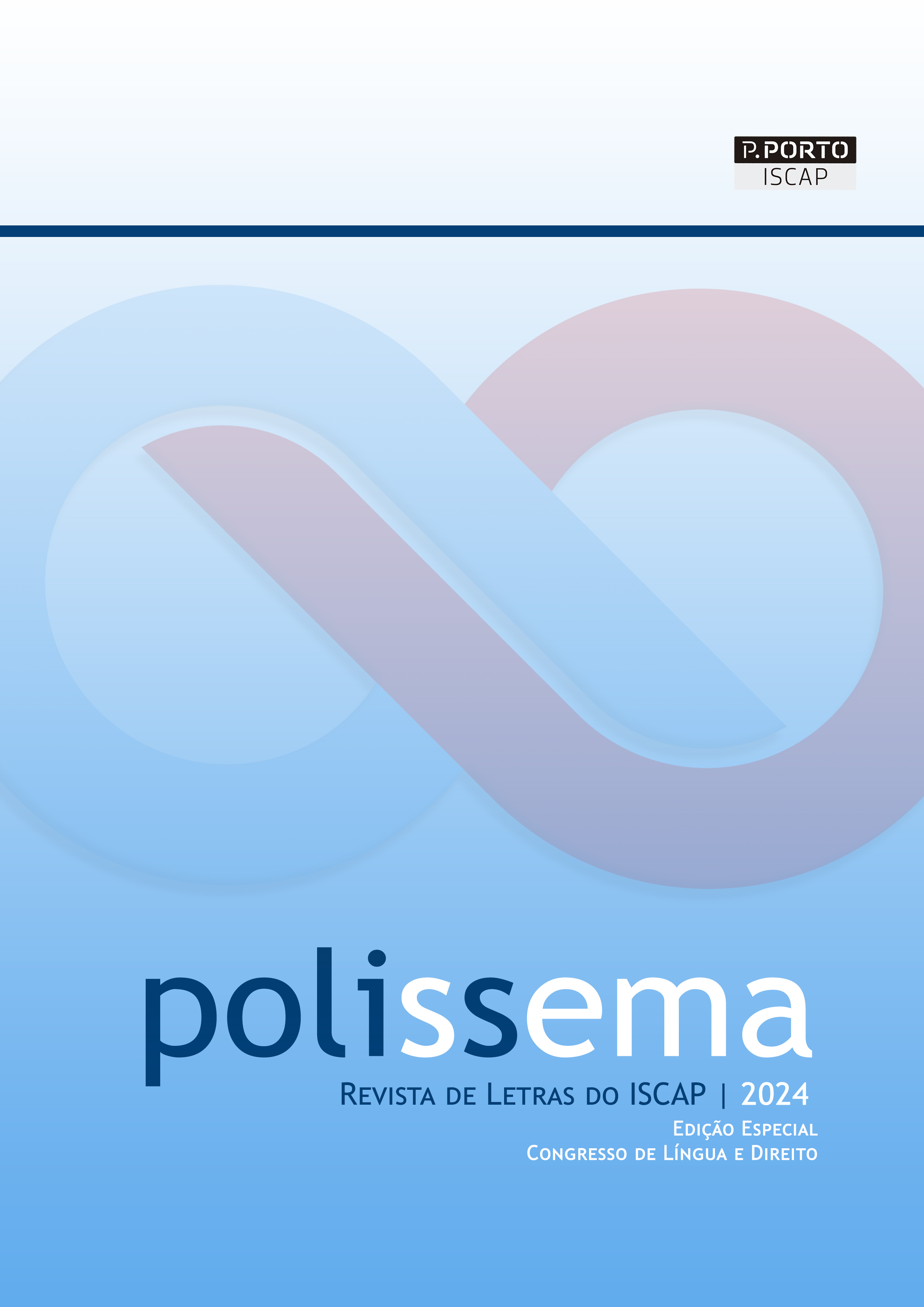The RIGHT USE OF LANGUAGE IN PREVENTION-REPRESSION OF HUMAN TRAFFICKING
DOI:
https://doi.org/10.34630/polissema.vi.5578Keywords:
human trafficking, vulnerability of the victim, right to language, Portuguese languageAbstract
Human trafficking has a damaging impact on the victim as diverse as it is serious, for example when the offence affects a person's life, dignity, freedom, integrity (physical and psychological) and assets. At the same time, human trafficking favours a positive ratio between the high financial profits for the perpetrator and the low risk of detection by the authorities. The Portuguese state has not been immune to the criminal phenomenon, and it can be deduced from the victims signalling that it has been a destination, transit and origin territory for these crimes. The detection made by the authorities indicates that the majority of the victims come from «third countries», with the following nationalities: Nepalese, Indian, Moroccan, Algerian, Brazilian and Romanian. The current context and, in particular, the difficulty victims of human trafficking with foreign origins have in mastering the portuguese language, encourages little interaction with the authorities. Although the focus of this study is the foreign victim, this approach is suitable for other victims who, for physical or intellectual reasons, do not fully master the Portuguese language. It is therefore necessary and urgent to analyse the use of language as a way of expanding the prevention and repression of human trafficking, indicating the following criteria for its implementation: literalness, culturability, inclusiveness, accessibility and translatability.
References
Alexandrino, J. M. (2007). Direitos fundamentais: introdução geral. Editora Princípia.
Benjamin, W. (2018). Linguagem, tradução, literatura (filosofia, teoria e crítica). Autêntica Editora.
Bobbio, N. (2004). A Era dos Direitos. Editora Campus-Elsevier.
Carvalho, A. T. (2012). Comentário Conimbricense do Código Penal: Parte Especial: artigos 131.º a 201.º. Tomo I. Coimbra Editora.
Carvalho, E. (2020). A especialização do advogado em violência doméstica. Galileu – Revista de Direito e Economia, Volume XXI, pp. 111-141.
Carvalho, E. (2023). Tráfico de Seres Humanos: A Tutela Político-Criminal. Editora Almedina.
Dias, M. C. S. (2009). Ofendida, lesada, assistente, vítima – definição e intervenção processual. Revista Julgar online, pp. 1-47.
Guia, M. J. (2019). Visão criminológica da terminologia associada ao tráfico de pessoas e ao auxílio à imigração ilegal promovidos pelas organizações criminosas. Criminalidade organizada transnacional: Corpus Delicti I, pp. 173-187.
Gonçalves, M. M. (2007). Código de Processo Penal: anotado - legislação complementar. Editora Almedina.
Mariani, B. et al. (2023). Prenatal experience with language shapes the brain. Science Advances, Vol. 9, Issue 47, pp. 1-7.
Medeiros, R. (2017). Constituição Portuguesa Anotada Tomo I. Universidade Católica Editora.
Mufwene, S. (2001). Ecology of Language Evolution. Cambridge University Press.
Patto, P. (2008). O Crime de Tráfico de Pessoas no Código Penal Revisto: análise de algumas questões. Revista do Centro de Estudos Judiciários, N.º 8, Especial, pp. 179-203.
Pereira, V. & Silva, A. (2008). Código Penal Anotado e Comentado. Legislação conexa e complementar. Editora Quid Iuris.
Pessoa, F. (2001). Livro do Desassossego, por Bernardo Soares – 1ª Parte. Publicações Europa-América.
Prata, A. (2019). Código Civil Anotado – Volume I. Editora Almedina.
Proença, J. & Fernandes, L. (2014) – Comentário ao Código Civil - Parte Geral. Universidade Católica Editora.
Sanz Mulas, N. (2006). Inmigración vs Delincuencia Organizada. El tráfico de personas para su explotación laboral y sexual. II Colóquio de Segurança, pp. 170-213.
Simões, E. (2009). Tráfico de Seres Humanos: Prevenção e repressão à luz do Protocolo Adicional à Convenção de Palermo. Revista Julgar online), pp. 1-16.
Sistema de Segurança Interna (2022). Relatório Anual de Segurança Interna de 2022. https://www.otsh.mai.gov.pt/relatorio-anual-de-seguranca-interna-2022/
Sousa, T. (2009). O Direito Penal na encruzilhada: Reflexões em torno da política criminal à luz da ciência política. Revista Julgar. N.º 7 (2009), pp. 145-160.
UNESCO (2010). Atlas of the World’s Languages in Danger. UNESCO Publishing. https://unesdoc.unesco.org/ark:/48223/pf0000187026
Valente, M. (2018). O reforço dos princípios constitucionais na obtenção de prova no mundo digital. Revista de Direito da Polícia Judiciária, Ano 2, N.º 3, pp. 11-25.
Veloso, C. (2023). Letras de Caetano Veloso. Editora Companhia das Letras.
Zizek, S. & Daly, G. (2004). Conversations with Zizek. Polity Press.
Downloads
Published
How to Cite
Issue
Section
License
Copyright (c) 2024 POLISSEMA – ISCAP Journal of Letters

This work is licensed under a Creative Commons Attribution-NonCommercial-NoDerivatives 4.0 International License.


